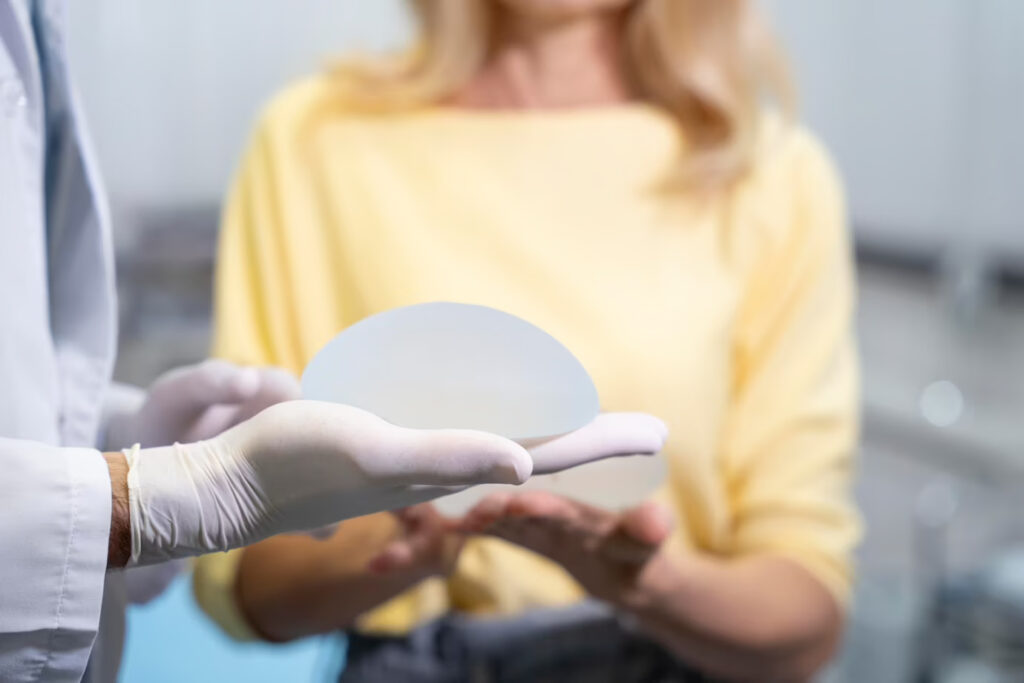Breast Implant Removal in Memphis
The goal of breast implant removal surgery is to remove breast implants from breast augmentation or breast reconstruction patients. During these procedures, the surgeon may also remove silicone material from implant leaks and the breast capsule, which is the scar tissue that formes after the placement of a breast implant.
Often, the scar tissue that forms after the placement of an implant is soft and does not need to be removed, but it may harden, causing pain and discomfort. This is often a reason to have the implants and scar tissue removed.
Breast implants are not lifelong devices and it is important to have them exchanged or removed approximately every 10-15 years. This decision is typically based on the individual and the patient’s needs and desires.

In general, you may be a good candidate for breast implant removal if:
- You are physically healthy and at a stable weight
- You have realistic expectations
- You are a nonsmoker
- You are bothered by the appearance of your implants
- You have experienced discomfort or pain
- You feel your breasts are too heavy
- You are starting to feel your breast scar tissue is getting harder or tighter
- Imaging suggests a leak or rupture of implants
- You have experienced a rupture or leak of implants
If you’re considering surgery, spend some time reviewing before and after photos and learning about what to expect during recovery. Preparation ahead of time helps patients have reasonable expectations and a smoother recovery.
Consultation and Preparing for Surgery
- Your surgical goals
- Medical conditions, drug allergies and medical treatments
- Current medications, vitamins, herbal supplements, alcohol, tobacco and drug use
- Previous surgeries
- Evaluate your general health status and any pre-existing health conditions or risk factors
- Examine your breasts
- Take photographs
- Discuss your options and recommend a course of treatment
- Discuss likely outcomes of breast implant removal surgery and any risks or potential complications
The Procedure
Risks and Safety
The decision to have breast implant removal surgery is dependent on many factors, including your overall health, if the implant is leaking, if the implant has ruptured and your personal desire. You’ll have to decide if the benefits will achieve your goals and if the risks and potential complications of breast implant removal are acceptable.
Your plastic surgeon and/or staff will explain in detail the risks associated with surgery. You will be asked to sign consent forms to ensure that you fully understand the procedures you will undergo and any risks or potential complications.
The possible risks of breast implant removal surgery include, but are not limited to:
- Anesthesia risks
- Asymmetry
- Bleeding
- Deep vein thrombosis, cardiac and pulmonary complications
- Fatty tissue found deep in the skin might die (fat necrosis)
- Fluid accumulation (seroma)
- Hematoma
- Infection
- Numbness or other changes in nipple/areola sensation
- Numbness or other changes in skin sensation
- Persistent pain
- Poor healing of incisions
- Possibility of revision surgery
- Recurrent looseness of skin
- Scarring
- Skin discoloration and/or prolonged swelling
- Skin loss
- Suboptimal aesthetic result
- Unfavorable scarring
These risks and others will be fully discussed prior to your consent. It’s important that you address all your questions directly with your plastic surgeon.
Recovery After Surgery
Following your breast implant removal surgery, gauze dressings or bandages and you may have drains. You may be placed in a support bra or surgical garment, and there are times that a compression garment may be used to minimize swelling following surgery.
After your procedure, you may need to have drains, which are small, thin tubes temporarily placed under the skin within the pocket to drain any excess blood or serous fluid that may collect.
You will be given specific instructions that may include:
- How to care for your surgical site(s) following surgery
- Medications to apply or take orally to aid healing and reduce the risk of infection
- Specific concerns to look for at the surgical site or in your general health
- When to follow up with your plastic surgeon
Be sure to ask your plastic surgeon specific questions about what you can expect during your individual recovery period.
- Where will I be taken after my surgery is complete?
- What medication will I be given or prescribed after surgery?
- Will I have dressings/bandages after surgery? When will they be removed?
- Will there be drains? For how long?
- When can I bathe or shower?
- When can I resume normal activity and exercise?
- When do I return for follow-up care?
Healing will continue for several weeks as swelling decreases. Continue to follow your plastic surgeon’s instructions and attend follow-up visits as scheduled.
Results
The final results of breast implant removal surgery will depend largely on the size of the implants being removed and the quantity and quality of your breast tissue that is left. The scar tissue that was surrounding your implants also will play a large role in your overall outcome. Swelling and postoperative changes will also need time prior to the final results. Healing can take up to one year before the final results are visible.
The practice of medicine and surgery is not an exact science. With this particular surgery, the results are not always cosmetic because the breast tissue is thin as a result of having implants for an extended period of time. The results can also be affected if the implants have been leaking. In some situations, it may not be possible to achieve optimal results with a single surgical procedure and another surgery may be necessary. It may also be necessary to have a mastectomy if silicone has gone throughout the breast and the free-floating silicone is no longer within the scar tissue.
When you go home, if you experience shortness of breath, chest pains or unusual heart beats, seek medical attention immediately. Should any of these complications occur, you may require hospitalization and additional treatment.
Following your physician’s instructions is key to the success of your surgery. It is important that the surgical incisions are not subjected to excessive force, abrasion or motion during the time of healing. Your doctor will give you specific instructions on how to care for yourself.
Robert Wallace MD
“Dr. Robert D. Wallace has been recognized for many years as one of the best plastic surgeons in the United States and has an international reputation for his work in craniofacial, cleft, and cosmetic surgery. He has been on Castle Connelly’s Top Doc list and Best Doctors award for many consecutive years. In addition, he was selected by Newsweek magazine in 2021 and 2022 as one of the top 100 plastic surgeons in the USA on their list for facelift and rhinoplasty surgery. In 2022 he was honored by Memphis Business Journal with the Healthcare Hero award in the physician category for his work in pediatric and craniofacial surgery. He has published multiple medical articles and book chapters in plastic surgery literature.”

Get In Touch
If you have any questions or want to schedule an appointment, contact us and our team will be glad to support you